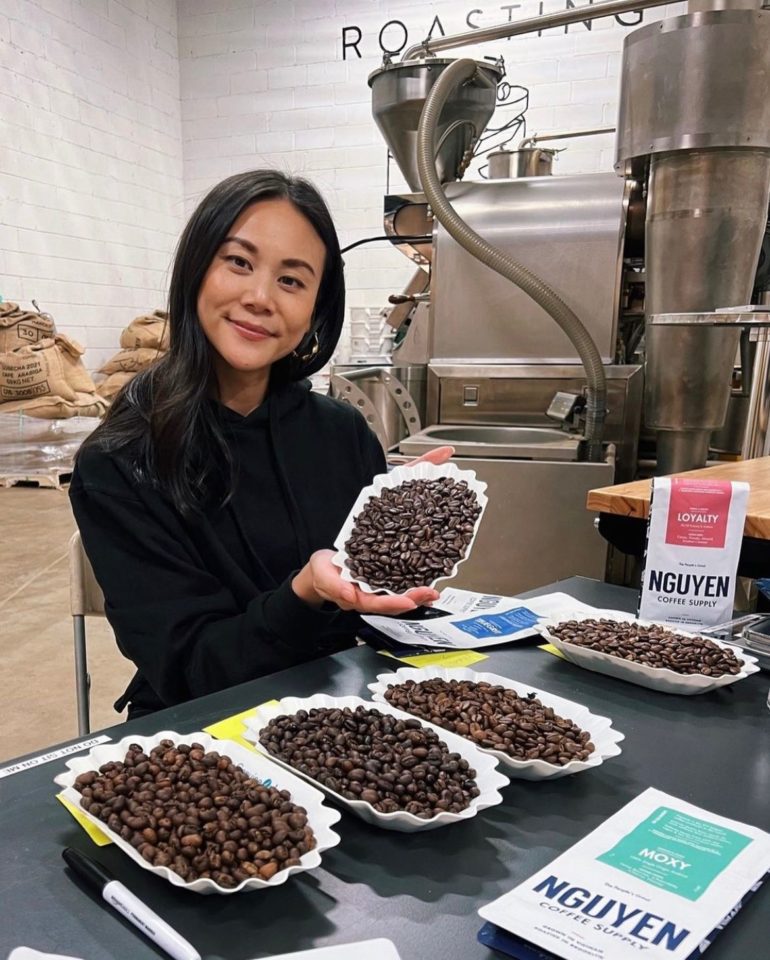
Sahra Nguyen firmly believes that robusta is the future of coffee. Her Vietnamese coffee company, Nguyen Coffee Supply, has championed the robusta bean and educated American consumers about why they should pay more for a bean that’s been historically misunderstood and criticized. Sahra has worked hard to start a conversation about robusta and the misconceptions people have that it’s a “lower quality bean”. For existing robusta farmers today, a shift towards robusta means farmers can immediately improve their crop, participate in a better market, and improve their quality of life.
It was helpful for Sahra to have a direct relationship with her farmers because she was able to work with them to help them improve their robusta variety. At the Vietnamese farms Sahra visited, all robusta beans were naturally processed, which is typical for Vietnam. This allows more sugars to remain on the bean since it has less fat. Sahra noticed that the natural process wasn’t to the standard that they wanted, but the process she preferred would be more expensive and labor intensive for the farmers. Sahra had to reassure them that she could sell the green beans for a higher price back in America. Sahra states, “If they are only being questioned about the commodity or instant coffee method, there’s no incentive to improve their product. And there’s no one talking to them about improving their product.”
Educating consumers about robusta has taken time and patience. Sahra started the conversation around Vietnamese coffee and slowly introduced people to the idea of drinking robusta. “I wasn’t ready to talk about it and people weren’t ready to grasp arabica and robusta, but Vietnamese coffee felt like an easy access point. So when I first started, I talked about Vietnamese coffee, leaning into the fact that Vietnam is the number two coffee producer in the world.” She felt like once people understood her vision and started grasping the concept of Vietnamese coffee, she could talk about robusta and start to change some misconceptions around the bean. Sahra had to deconstruct and challenge the narrative that existed and the language people had been using about robusta.
Sahra pushed beyond the beans in order to unpack these old ideas. Part of her journey to educate people on robusta started with explaining that It’s not just about taste profiles or taste buds, it’s about the hard working farmers all around the world whose livelihood depends on growing coffee. The language around robusta is harmful because it traps entire robusta communities all over the world. Collectively, Sahra believes that we must talk about coffee and bring it back to the people and humanity in the coffee experience. When Sahra started to have coffee conversations with media outlets, she was able to explain that talking negatively about coffee means entire communities growing robusta around the world can’t improve their crop and sell their coffee. Once she unpacked that frame work, people started realizing that their language was harmful and were really receptive to her words. What makes an agricultural product “good” or “bad” is not inherent to the variety, but rather it’s related to socio-economic constructs and production quality. Lower quality arabica beans also exist on the market, yet people automatically associate the variety of arabica as superior, with packaging proudly claiming “100% arabica” when relevant. Sahra says, “Let’s talk about why we are having conversations about coffee in an elitist, classist framework. Can we expand our perspective and talk about the unique characteristics of an arabica bean and the unique characteristics of a robusta bean, and how different experiences resonate with different coffee drinkers? And if there’s “bad” coffee in the world, how can we work together to make it better?”
When I asked her how companies can advocate for smaller voices, be more inclusive, and be more transparent in their business, Sahra says, “For big companies who want to build an inclusive coffee culture and world, be inclusive of robusta. Not just in your product offering and product transparency, but in your consideration and conversations on making coffee better”. Sahra stresses that her goal is to not replace arabica with robusta, or vice versa. She says “Arabica and robusta beans each offer something unique to the world. They are simply two different coffee varieties that speak to different experiences, and it’s our job to provide diversity in offerings (and perspectives) for people to make up their own opinions about arabica and robusta coffee.” As the awareness and appreciation for robusta grows, she wants people to mention robusta, claim it, own it, and appreciate it. This will create a massive paradigm shift, help the farmers, and be beneficial for the inevitability of climate related coffee farming issues. The road of robusta for Sahra Nguyen has been long and challenging, but she knows that changing the paradigm around robusta will help create a better future for coffee, the consumers, and the hard-working farmers all around the world.
Check out Sahra’s website, Nguyen Coffee Supply here!